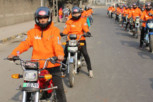
Lahore
There has always been great talk about empowering the women of Pakistan. Real empowerment, however comes from action and finally women in the country are out to reclaim what naturally belongs to them and had been taken away when extremists flourished under the rule of General Zia ul Haq.
The women, whether driving bicycles, motorcycles or working as cab drivers or rickshaw (auto) drivers are on the move to reclaim the roads. The initiatives are not only from individuals and activist groups, but the government is also encouraging women to show their independence by taking up all kinds of occupations and driving to their educational institutions and offices on motorbikes rather than waiting for someone in the family to drop them.
The Punjab government recently approved a Rs80 million (Dh2.8 million) project called Women-on-Wheels under which subsidised bikes are provided to women bikers. Bikes will have a specific colour theme and bear the Women on Wheels logo. The project initially started in five districts — Lahore, Faisalabad, Sargodha, Multan and Rawalpindi, where registrations, training and rallies are currently in progress. The training will end with staging of a mega rally involving women from all five districts.
Chief Minister’s Strategic Reforms Unit in collaboration with the respective city district governments, district coordination offices, city traffic police and Honda Atlas as their official partner started the Women-on-Wheels (WoW) initiative to empower women by providing them with the necessary skill-set.
Salman Sufi (Director General Strategic Reforms Unit) talking about the programme said it has received massive support from the masses. “SRU’s Women-on-Wheels programme serves to increase women’s mobility and promises a platform for women to attain their rightful independence,” he said.
In Lahore 530 women have been registered. Of them 284 have been trained. In Faisalabad 680 women were registered while 140 of them have been trained. In Rawalpindi 60 women of the 500 registered have been trained. In Sargodha 150 of the 324 registered have been trained. In Multan 60 women have been trained of the 287 registered.
One of the first to start the move to reclaim the roads was Zar Aslam who started the Pink Rickshaw Scheme in 2015 with a three-wheel rickshaw (auto). Now there are nine plying the city roads and two are in the pipeline.
“We trained the women and then handed over these rickshaws to them on easy instalments. We provide them roadside assistance on hotline and can reach them in minimum possible time. The scheme is working smoothly. It shows there is social acceptance of women working as rickshaw drivers,” Zar told Gulf News.
Women driving rickshaws are mostly in the 30-plus age club. Naseem Bahar, aka Malika, is 50 years old. Her husband started a new business after suffering a loss in a venture while she decided to drive the rickshaw.
“I am very optimistic about my career in rickshaw driving,” Naseem said.
Rehana Kausar, 36, and Sidra Bano, 44, are also both rickshaw drivers. They both say it only needed a little courage in the beginning. “Now it is routine. We pick our customers mostly women and children from their offices and schools and ensure quality service,” they said.
Women cabbies
A number of women have started driving cabs in Lahore. Uber and Careem also hire women as drivers and they can earn up to $700 (Dh2,571) to $800 a month.
Zohra Ali, 27, was first working for Uber, but has now shifted to Careem. She was among the first to help break the taboo that women cannot drive cabs.
“Joining the Careem’s team I feel my life’s half journey is complete. I feel honoured to be among the pioneers in this profession. Sky is the limit. I love the thrill of driving,” Zohra said.
Every Sunday, Rafia Khan, 30, takes part in Canal Cyclist Community’s (CCC) weekly rides. It was not easy for a girl to be on the road, but her passion and encouragement from CCC led her to reclaim city roads and streets.
“The cycle ride is a lifetime experience, especially when you are a married person. The irony is that in Pakistan people are not yet motivated to reclaim the roads and streets as [it is] in Europe,” Rafia said.
In 2013, at the age of 29, Shazia Imran (Shazia Mushtaq before marriage) became the pioneer among Lahore’s women, riding a scooty across the city.
“At that time, I was working to establish my fashion photography business. The first ride was unforgettable. It was like a ride on roller coaster. Later my driving skills improved and driving became fun,” Shazia said with a glint in her eyes.
Shazia and many others like her have been successful in reclaiming their space on public places and roads only because of the change that is coming in Pakistani society.
Their parents and brothers have been supportive and social acceptance in society is increasing.












